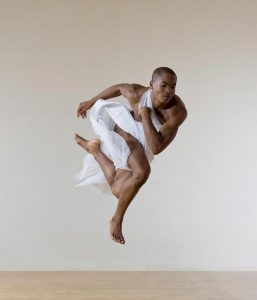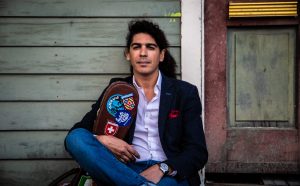Bodies of Knowledge brings together eleven international contemporary artists to reflect on the role that language plays in archiving and asserting our cultural identities. Working with materials that range from books and silent film to ink, ashes and musical scores, eleven artists propose language as a living and ever-evolving document that can counter more staid and static ways of representing our collective pasts.
The exhibition opens on Friday, June 28, with a lineup of Friday Nights at NOMA programming that includes an original dance performance based on the black experience, gallery talks by three of the represented artists, and the first in a series of collaborative music performances led by a Moroccan-born New Orleans-based musician who will improvise with a Brazilian samba band.
5 pm | BLACK MAGIC DANCE PERFORMANCE
For Bodies of Knowledge, artistic director Edward Spots and choreographer Donna Crump have developed a new site-specific dance performance at NOMA, titled Black Magic, that will unfold in five distinct dance movements: Black Suffering, Black Anger, Black Beauty, Black Love, and Black Joy. This work will explore varying aspects of black cultural identity through dance and the body. Investigating a range of topics from suffering, to beauty, to joy, this original work will depict joy as a form of resistance to dominant depictions of the black experience, and consider what is often forgotten and omitted from prevalent representations of black life. This work will be performed by Spots, Crump, and twelve youth dancers from Dancing Grounds, a New Orleans-based nonprofit organization that builds community through dance with programs that work at the intersection of arts, education, and social justice.
NOMA visitors should assemble outside the museum’s front entrance at 5 pm. The dance performance will begin outdoors and the audience will follow the dancers into the Great
► Read an interview with Edward Spots where he discusses his dancing career and the origins of the Black Magic performance.
6 – 7 pm | GALLERY TALKS
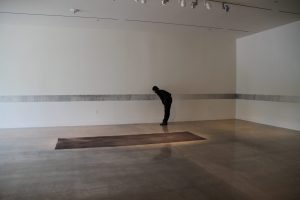
Adriana Corral, Memento, 2013–present, Site-specific installation, Dimensions variable, Female victim names (Juárez, Chihuahua, Mexico) transferred onto (three) walls: acetone, ash burial plot in the center of the space (dimensions of plot, 4ft x 8ft x1inch), Ashes obtained from burned name listings transferred onto wall, Installation image from the McNay Museum, San Antonio, Texas, 2013 © Adriana Corral
6 pm • Adriana Corral
In her spare and often ephemeral installations, Adriana Corral makes use of subtle materials like ash, soil, and burned paper to acknowledge histories of political violence throughout Central and South America. Memento is a site-specific installation that addresses the 2003 homicide of eight young girls in Ciudad Juárez, Mexico, as well as the widespread phenomenon of “enforced disappearances” of women throughout the region.
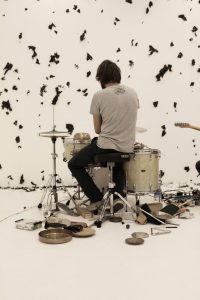
Manon Bellet, Brèves braises, 2010–present, Site-specific installation, Burnt silk paper affixed to the wall, Dimensions variable, Image courtesy of the artist from a performance at Kunsthal Nord, Aalborg, Denmark, 2017, Photo by Niels Fabæk © Manon Bellet
6:30 pm • Manon Bellet
In her site-specific installation Brèves braises, Manon Bellet affixes the charred remains of burned paper on the walls of the museum. From these tattered remains, she creates a script or musical score that runs across an entire length of a long white wall. Created in collaboration with musicians that Bellet invites to compose an accompanying musical score, these burned fragments of paper have a graphic dynamism and rhythm that resembles that of improvisational music or impromptu speech. Over the course of her installation, she allows these papers gradually drop to the floor, encouraged by movement of air generated by the improvisational energy of bodies and instruments as the move through and activate the installation.
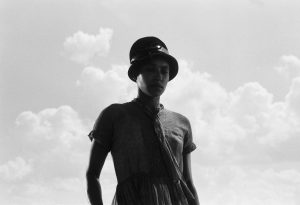
Garrett Bradley, America (film still), 2019, Multi-channel video installation, 35mm film transferred to video, black and white, sound, Image courtesy of the artist © Garrett Bradley
7 pm • Garrett Bradley
Garrett Bradley’s multi-channel video installation America reimagines a lost history of African-American silent film. Bradley, a filmmaker and artist based in New Orleans, takes as her starting place a 2013 survey conducted by the Library of Congress—which states that 70 percent of American silent films made between 1912 and 1929 have gone missing—to propose that there was an entire body of cinema made by and for African American audiences, artists, and filmmakers, created and since lost.
5:30 – 8:30 pm |SAFAR music series: MAHMOUD CHOUKI with AMIGOS DE SAMBA
In the first of series of musical collaborations under the collective title Safar—which means “to travel” in Arabic—Mahmoud Chouki will collaborate with Amigos de Samba. This series of site-specific performances for Bodies of Knowledge explore how music can speak across cultural divides to envision new forms of dialogue between East and West.
Chouki is a master guitarist, multi-instrumentalist and composer living and working in New Orleans. His art draws together music from many different international contexts to consider how music can speak across cultural divides. His own compositions incorporate musical influences from across the globe, ranging from European classical, Andalusian from Southern Spain, Levantine music from the Middle East, Maghrebian music from North Africa, Latin American music, and jazz from the southern United States.
The Amigos specialize in samba traditionally played around a table with a variety of Brazilian percussion and string instruments. Their mission is to bring the “Roda de Samba,” well-known in Brazil, to New Orleans. The group is formed by a mix of Brazilian and US natives, including Ezra Spira-Cohen, Felipe Leite, Leo Oliveira, Nicolas Bell, Scott Myers, and Tedo Oliveira.
Friday Nights at NOMA is supported in part by grant funds from the Azby Fund; Ruby K. Worner Charitable Trust; New Orleans Jazz & Heritage Festival and Foundation; and the Louisiana Division of the Arts, Office of Cultural Development, Department of Culture, Recreation and Tourism, in cooperation with the Louisiana State Arts Council.
